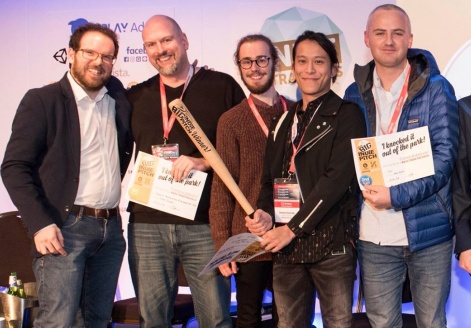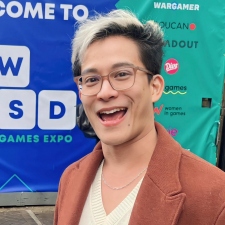Pocket Gamer Connects London returns on 22nd-23rd January 2024, celebrating its 10th anniversary. Of course, this also means the return of our flagship Very Big Indie Pitch, the popular pitching competition that's been providing developers with insight, feedback, and prizes for years. It's also great fun. We spoke with the organiser Sophia Aubrey Drake for her memories and tips earlier in December.
What better way to celebrate ten years of Pocket Gamer Connects than by reconnecting with some of our most successful developers? In this series, we’ll learn more about where they are now, what they gained from their pitching experiences, and what advice they have for anyone heading to London for the Very Big Indie Pitch in 2024.
Next up, we're catching up with FINIFUGU && friends, the only developer to have won the pitch back to back, to learn more about their past, present and future.

Sophia Aubrey Drake: We know you well, but can you introduce yourself and the team for those who may not know about you?
Jai Bunnag: I’m the co-founder of FINIFUGU Games, a studio crafting casual mobile games for a primarily female audience. Alongside my partner Chris Li, we operate a remote team spread across Thailand, Hong Kong, and the UK.
Our first game as a duo began with Too Many Cooks, a co-op cooking game we submitted to the Big Indie Pitch, quickly followed by Nood Climbers, which is self-explanatory.
You’ve been part of the pitch numerous times, famously being the only developer to win it back-to-back. What first made you want to be a part of the pitch?
Jai Bunnag: Before teaming up with Chris [Li, co-founder], I’d been pitching at techy spaces and events with my games-adjacent interactive mobile experiences. While interesting, they were a bit too esoteric to be commercially viable, especially for a first project.
Re-adjusting the content for a short format forced us to identify what strongly resonated with audiences and made our games specialJai Bunnag, FINIFUGU && friends
After partying up, we pivoted creatively to being more intentional with our design vision with a clear focus on the mobile games market. Too Many Cooks [TMC] came together surprisingly quickly, and we submitted it as soon as it was playable.
Entering the Big Indie Pitch was our first step in testing our partnership and new direction. So, the BIP was officially our first step into this industry and we’re super thankful for such a warm welcome!
How did you find the experience? What was the most challenging aspect, and was there anything you weren’t expecting?
Jai Bunnag: By the time Chris and I sent TMC over, we were very warm and pitch-ready from a year of failing and learning. So pitching at the BIP was quite cathartic. It’s shockingly fast-paced, but it felt great when our pitch plan held together.
We did a lot of preparations and practice, but it felt like many lessons learned during that previous year were now paying off, with renewed direction and focus.
I think choreographing the pitch was tough - juggling both execution and content. A game, its story and its appeal are often so much larger than the pitch time. But re-adjusting the content for a short format forced us to identify what strongly resonated with audiences and made our games special which then helped to inform development.
What happened with Too Many Cooks and Nood Climbrs following the pitch? Did your experience as a part of The Big Indie Pitch impact on your development and subsequent release?
Chris Li: Following the pitch, Too Many Cooks partnered with Playstack and Noodle Climbers with Noodlecake. The Big Indie Pitch was pivotal in several aspects. It clarified our thoughts, highlighting the strength and core value of our design, and guided us in refining the design to be minimalist, approachable, and simplistic while maintaining the core charm of the mechanics and gameplay.
It also helped us practice game pitching and selling our ideas to potential publishers and partners, turning a small prototype into a commercial-ready product. Moreover, it drew the attention of industry stakeholders like investors, publishers, and app store representatives, marking a great starting point for us as a newly established indie studio.
How have things changed for you as a team since we last saw you? Can you share some of the things you’ve been working on since then?
Chris Li: There’s been a lot of growth and change. Our team has expanded to eight members with diverse talents, enhancing our product quality and development speed. We’ve explored different market positions, from commission-based work to hyper-casual games and web3 projects.
This journey has laid a foundation for developing more commercial casual self-launched titles like Otter Ocean and a partnership title, Life of King, published by Pixio. We’re also excited about a new cute, idle-management game expected to launch in 2024.
Considering the fast-evolving games industry, how difficult is it to survive as an indie developer? What changes have you experienced since participating in the Big Indie Pitch?
Chris Li: Surviving as an indie team is increasingly challenging in the fast-paced and evolving gaming industry. The rapid growth of mobile games and market saturation by large studios mean that a game must excel in aspects like core mechanics, monetisation strategy, retention optimisation, and marketing to succeed financially. We’ve been learning and improving our design and development skills to compete in this challenging industry and using third-party services to enhance the game cycle from design to customer service.
Be strategic with your resources, and don’t be afraid to terminate projects early if they’re not viable, to avoid sunk costsChris Li, FINIFUGU && friends
Is there any advice you would give to indie developers out there based on your success?
Chris Li: We’ve managed to sustain and grow our team with some launched titles we’re proud of. My advice to indie developers is to keep building because each project improves your skills for the next one.
Be strategic with your resources, and don’t be afraid to terminate projects early if they’re not viable, to avoid sunk costs. Also, don’t hesitate to show your games to others! Platforms like the Big Indie Pitch are excellent for practising pitching skills and getting valuable industry feedback.
How important is attending conferences, competitions and networking opportunities for independent developers? What advice would you give developers considering attending conferences?
Chris Li: It's crucial, especially when starting out. They provide insights into market trends and new technologies, which are valuable for positioning your product in the future. My advice is to start as a guest or visitor, get comfortable with networking, and, once you have a working prototype, try to have a booth for networking and feedback.
Competitions are also beneficial because winning can boost confidence, provide valuable presentation experience, and open doors to investments or publishing deals.
What is your studio currently working on?
Jai Bunnag: We’re currently working on our second self-published game, Animal Express, where players manage a train that ferries cute animals across the world. We’re also increasing support for our ongoing game, Life of King, a derpy, simplified prehistoric city simulator.
Chris Li: Additionally, we’re keeping an eye on new gaming markets like AR, VR, and MR and exploring opportunities in the web3 gaming industry for potential new interactive experiences.
Want to show off your exciting new game? All details for the Very Big Indie Pitch at Pocket Gamer Connects London 2024, including how to enter, can be found on our upcoming events page on BigIndiePitch.com.
If you just want to attend the conference, then tickets for Pocket Gamer Connects London 2024 (22-23 January) can be found on the Pocket Gamer Connects Website, with mid-term discounts still currently available until the first week of January.
Get the latest news, interviews and in-depth analysis on Twitter, Facebook, and our daily newsletter. We will be adding more Big Indie Pitch stories to the site each week.




















